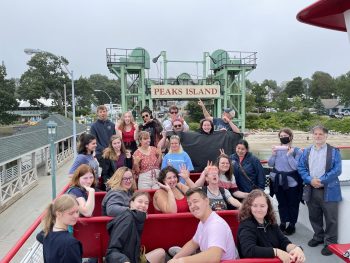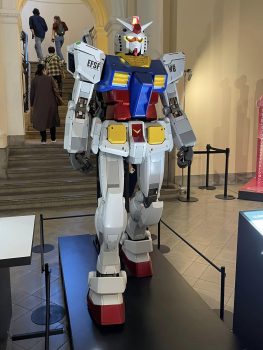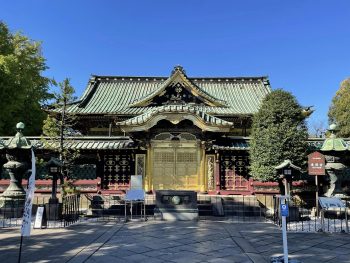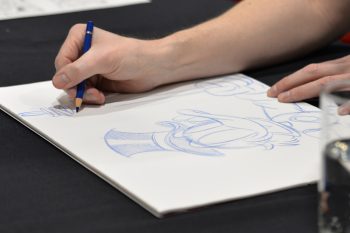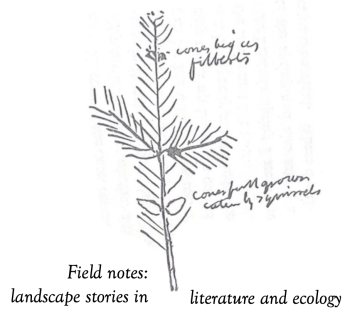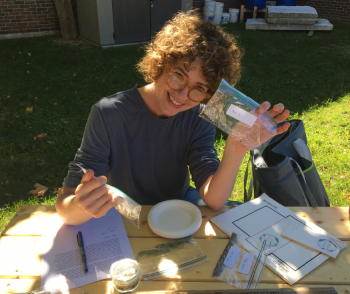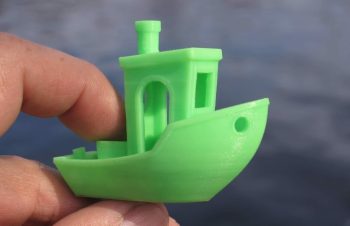Research Learning Experiences (RLEs) invite students to move from being passive to active learners through experiential learning in which they create new knowledge and explore different career paths. In collaboration with business and community leaders, students engage in projects in which they can:
- Learn by doing
- Express themselves artistically
- Contribute to a service initiative, and/or
- Take part in authentic inquiry through project planning, data collection, analysis, and reporting.
UMF incorporates RLEs into the first-year experience by including high impact activities and career exploration in the First Year Seminar, including the First Year Fusion program which offers incoming students to spend a week prior to the Fall Semester engaging course-themed activities across Maine, New England, and even internationally. This early high-impact learning permits the students to develop a strong cohort, build pre-professional networks, and have access to extensive, individualized mentoring.
UMF builds upon the initial RLE foundation with Advanced RLEs that are offered through discipline-specific courses. Advanced RLEs engage students with external partners relevant to professional practice and career exploration, with the intention of building toward internships, practicums, clinicals, or other pre-professional student experiences supported by the Pathways to Careers program.
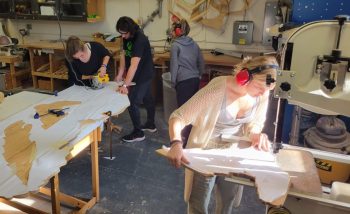
RLEs are supported by a generous donation from the Harold Alfond Foundation as part of UMS TRANSFORMS.
Fall 2023 RLE Courses
First Year RLEs: First Year Fusion
The Good Life
Fusion Week I (Aug 11-17): Flagstaff Lake, Carrying Place Township, ME
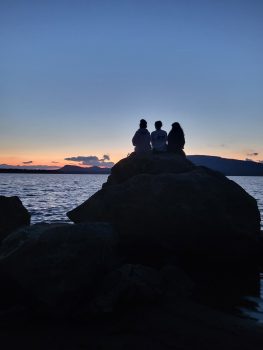
FYS 100 Section 9
Linda Beck
Credits: 3
Course fee: $100
In The Good Life course, you are invited to set aside time as you begin your undergraduate career at UMF to think about what may be the most important questions in life: What counts as a Good Life? How do I go about living that Good Life? What will be my great work for the good of all? During Fusion week, you will begin the course at a tranquil retreat on Flagstaff Lake run by Maine Huts and Trails. You will stay in cabins along the lake where you can calm your mind, and focus on what really matters. We’ll read inspiring texts that explore The Good Life and have meaningful conversations while spending time in nature, walking the trails, and canoeing the river. Throughout the semester, students will explore their values and visions of The Good Life, articulating it in a final project through a medium of their choosing.
- Spend time at a tranquil retreat on Flagstaff Lake
- Enjoy nature while you contemplate what the Good Life means to you
- Engage in meaningful conversations and develop important connections with classmates as you transition to the UMF community
Urban Maine: Stories and Sounds
Fusion Week II (Aug 21-23): Portland, ME
FYS 100 Section 5
Lewis Robinson
Credits: 3
Course fee: $100
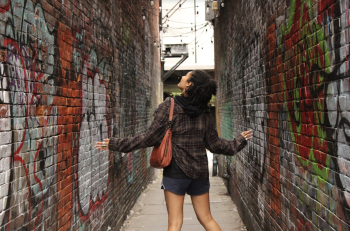
Maine is more than a pastoral vacationland. Cities like Portland, Augusta, and Belfast that continue to evolve and add new layers to their unique histories. During Fusion Week 2022, Urban Maine: The Stories and Sounds, students traveled to Portland where they explored one of Maine’s premier coastal cities and met with a wide variety of Maine city dwellers: from fishermen to artists, shopkeepers to chefs. During the fall semester, through their collaborative collection of individual narratives and soundscapes, they created their own work in the form of audio podcasts, sound collages and videos. Next year we plan to return to Portland to continue our exploration of this vibrant, ever-changing city and its diverse sites, sounds, and people.
- Explore the Coastal Maine cities of Portland and Belfast
- Investigate how the dynamics of sounds shape place and experience
- Learn how to record and produce audio
- Craft powerful stories from the soundscapes you collect
- Collaborate with your classmates as you explore Maine and join the UMF community
Yolanda Ares (’26): “I lived in a city, so for me that wasn’t much of a big difference. But the people we met and interviewed to capture their stories, that is what I truly took away from the experience… When you learn something new, as that stranger becomes a friend in that moment, them telling you their story really impacts you.”
Japan Through Time and Space
Global Fusion Week (July 30-Aug 10): Tokyo, Akita, and Kyoto
FYS 100 Section 10
Sarah Maline
Credits: 3
Course fee: $2600
Almost 400 years ago, the great poet-monk-traveler Matsuo Bashô wrote that “every day is a journey, and the journey itself is home.” Through the Japan Global Fusion course, your UMF journey will begin with a pre-semester trip to Japan where you explore many of the unique places and spaces Bashô encountered in his journeys. We first visit Tokyo, the global city of light, movement and futuristic fantasy where we immerse ourselves in Japanese culture, history and food. We then travel to the far north of Japan’s Honshu island to explore Akita with Japanese university students and faculty from UMF’s sister school, Akita International University. We will arrive in time to experience the Kantô Matsuri harvest festival, visit an active local farm, and meet the legendary local Namahage demons who try to scare the laziness out of children and adults alike. We then travel to the ancient Japanese capital of Kyôto, exploring its narrow streets and temple paths to discover the places of old that still exist within this modern city. We will then take Japan’s famous bullet train back to Tokyo where we catch our flight back home and then regroup in the fall to continue our discussion with our Akita counterparts through a Virtual Global Experience (VGE).
During the trip, we will build our own individual tabi nikki, or travel diaries, drawing inspiration from historical artworks, the diaries of historical Japanese travelers and our own experiences through writing, photography, video and sound recording, and even drawing or painting—whatever processes you want to use to document your time in Japan. When we return to UMF, we will work together to create a group diary project to synthesize our experiences and share them with the campus and local community. Through a project-based VGE with our friends and colleagues from Akita, we will analyze how our expectations and memories of the places we visited activate and/or alter our understanding of those places, and how places build and hold meaning through space and time.
First Year RLEs: First Year Seminar
Life, Work, Success & Meaning
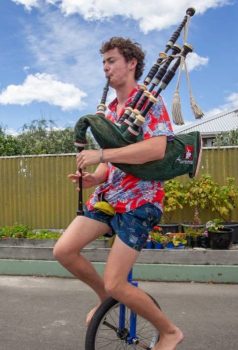
FYS 100 Section 3
Scott Erb
Credits: 3
You are beginning your college career during a time of global transformation on multiple levels: the technology/information revolution, climate change, globalization, and changes in the work world, Your career paths will be very different than those of past generations.
This course is designed to give you tools and abilities to use your college experience to navigate a path to a career and life that fits your own values and goals. In this course you will be responsible for undertaking a project personal to you, reflecting on your values and interests in order to research various life/career paths. Your goal is not to figure out where you’ll end up, but how you’ll explore the options and possibilities, using the tools available at UMF (classroom, student support, and connections with alumni and the community). This includes practical activities (developing a resume, researching career possibilities), personal reflection (developing your own statement of value, focused on what you find meaningful), and an overall project of developing a strategy to use your college experience to prepare for a future that fits your values and interests. Class will include discussions about how the world is changing (culture, the economy and technology), what it means to reflect on ones’ own values, and how to handle obstacles certain to come your way. The goal is not to figure out exactly where you’re going, but to have you take responsibility for your education, using it to explore, learn and prepare for a meaningful life in a changing world.
First Year RLEs: Honors First Year Seminar
Making Things with Words
HON 101 Section 3
Steve Grandchamp
Credits: 3
What does it mean to publish a written work? In “Making Things with Words,” students will explore small-scale and creative acts of publishing, such as: Emily Dickinson’s letter poems and handmade booklets; the zines that flourished in the 1970s and 1980s; and popular contemporary graphic memoirs. In this way, this course will introduce students to the principles and practices of creative visual and literary publication. Working with words and images created by themselves and others, students will accordingly craft a final creative project in the genre of their choice (handmade booklet, zine, or graphic memoir). Class readings and discussions will cover the history of the book, the impact of changing technology on the reading experience, and the relationship between form and content across media. To expand students’ understanding of the relationship between image and meaning, the class will visit the Portland Museum of Art for a guided tour and discussion of museum holdings and artistic methodology. They will also collaborate with a published graphic memoir artist in workshop sessions that develop their skills for visual communication. Along the way, students will talk with professionals working in the poetry, magazine, and comic industries in order to explore career pathways related to the course content and projects.
Field Notes: Landscape Stories in Literature and Biology
HON 101 Section 11
Rachel Hovel and Noelle Dubay
Credits: 3
Whether one is a scientist or a poet, “making sense” of the world calls upon a common set of practices: observation and inquiry, inference and connection. When we encounter the wondrous or new in our environments, we try to describe and explain–but sometimes the most discovery takes place at the limits of our definitions. What do we know, and how do we know it? This course will explore approaches from the natural sciences that have opened new insights and opportunities for learning, and will look for similar transformative moments in literature. We will use examples from the past to examine legacies of colonization and extraction, and look forward through visions of futuristic science fiction. Throughout, students will work individually and collaboratively on their own research processes, including keeping a field notebook that will be used to synthesize findings, working as a team to research human and/or natural dimensions of our local landscapes, and crafting multimedia presentations to share new insights. Students will also learn about multiple careers that use different types of “field notes”, through guest speakers or project partnerships with a field biologist, a popular science writer, and a creative writer who focuses on the natural world.
Advanced RLEs
Food: On Purpose
ANT 300
Gaelyn Aguilar
Credits: 3
Preparing Students for their Ikigai: the Japanese concept that loosely translates as “that which makes life worth living”
This course explores how food became a deeply catalyzing force for living and working on purpose. We do this through giving attention to generativity and learning to co-generate [with other generations] in order to regenerate ourselves and the planet. In our purpose-driven exploration of food, we will discuss topics such as food insecurity, food memories, regenerative agriculture, food sovereignty, and other human and cultural connections to this centrally important element of our lives as people and groups of people. We will:
- Attend Common Ground Country Fair and conduct research and interviews with fair participants and vendors
- Visit Temple Tappers, an award-winning, family-run pursuit of tapping birch trees to produce Pure Birch Syrup, “one of the unique tasting delights on the planet”
- Create an end-of-the-semester dinner party inspired by Generations Over Dinner, “a decentralized program intended to engender meaningful conversations across generations by modeling and creating an experience that connects and values perspectives across the age continuum”
Creativity and Professional Narrative
PSY 284 (Professional Seminar)
Joey Essoe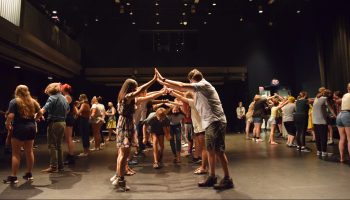
Credits: 3
Preparing Students for Internships and Graduate Training in Psychology
Overview: In this student-centred, workshop-style course, students will explore the simple but profound questions of “What’s your story? What do you want to do as a psychologist? Why are you the perfect person to do just that?” To this end, students will discuss the topic of creativity, reflect deeply on their futures as psychologists, practice skills and routines that enable successful careers without neglecting self-care, and develop compelling and fundable narratives for their future work.
Assessments: As a class, students will develop a creativity-related research project; individually write a 5-page graduate fellowship grant proposal; and individually generate video presentations to pitch their narratives and their project.
Class activities will include:
1. Readings and discussions on creativity and professional development
2. Developing individual narratives as psychologists
3. Guest speakers in relevant career paths
4. Literature search and evaluation
5. Designing a research project and identifying suitable instruments (e.g., experimental task, questionnaires, etc)
6. Conducting individual “internet Easter egg hunts” to figure out what a funding agency is looking for in fellowship applicants (then write the application and pitch it in videos)
7. Participate in a university-funded, self-service weekend retreat to (a) reflect and discuss possible career paths, and develop next-steps to investigate and pursue these paths, and (b) practice self-care routines, life skills (e.g., making a balanced plan between work, relationships, and play)
3-D Design and Printing
MAT 177 Section 1
Dan Jackson
Credits: 3
Exploring careers in 3D Printing, CNC Machining, and Precision Design Fields
Why Take This Course?
With a focus on real-world uses and ongoing learning in the technical world of 3D design and printing, MAT 177 will provide you with the knowledge and tools you need for success in a wide range of creative and technical pursuits. We take students on an engaging adventure into the world of 3D design and printing. Here’s what you can expect:
Getting Started: Learn the basics using TinkerCAD, and then move on to more advanced skills in Fusion360. You’ll learn how to turn your ideas into digital 3D models and actual physical objects.
Hands-On Challenges: Participate in real design challenges, including a final project where you’ll create a product that solves a real-world problem.
Industry Insight: Enjoy guest appearances from industry experts who will present special challenges and offer unique insights into the field.
Research and Learning: Engage in weekly projects using professional 3D design software. You’ll have the chance to experiment, analyze your results, and think about what you’ve learned.
Showcasing Your Work: Create a reflective portfolio of your designs to highlight your growth and creativity throughout the course.
Collaboration and Community Engagement: Work with local CNC experts, present your design portfolio to the UMF community, and connect with community partners on your final project.
Mathematics in Design: Learn how to use mathematical principles to improve your designs, reduce waste, and make your designs more effective.
Criminality, Freedom, and Justice
ANT 257
Nicole Kellett
Credits: 3
Preparing Students to Work in Law Enforcement, Corrections, and Social Service Organizations
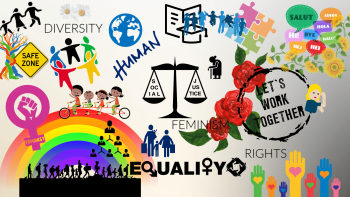
Centering racial and gender injustice as a root cause of massive incarceration, conflict and war, intergenerational trauma, and barriers to truth and reconciliation, this course explores the history of injustice and cultivates imagining opportunities for a free and just society. Throughout the course students engage with individuals working towards social justice including lawyers, commissioners, Maine State representatives, non-profit leaders, previously incarcerated individuals, among others. By engaging in informational interviews, public writing, in-class debates, and workshops with system impacted individuals, students gain hands-on experience with social justice issues that can be applied to a range of careers.


